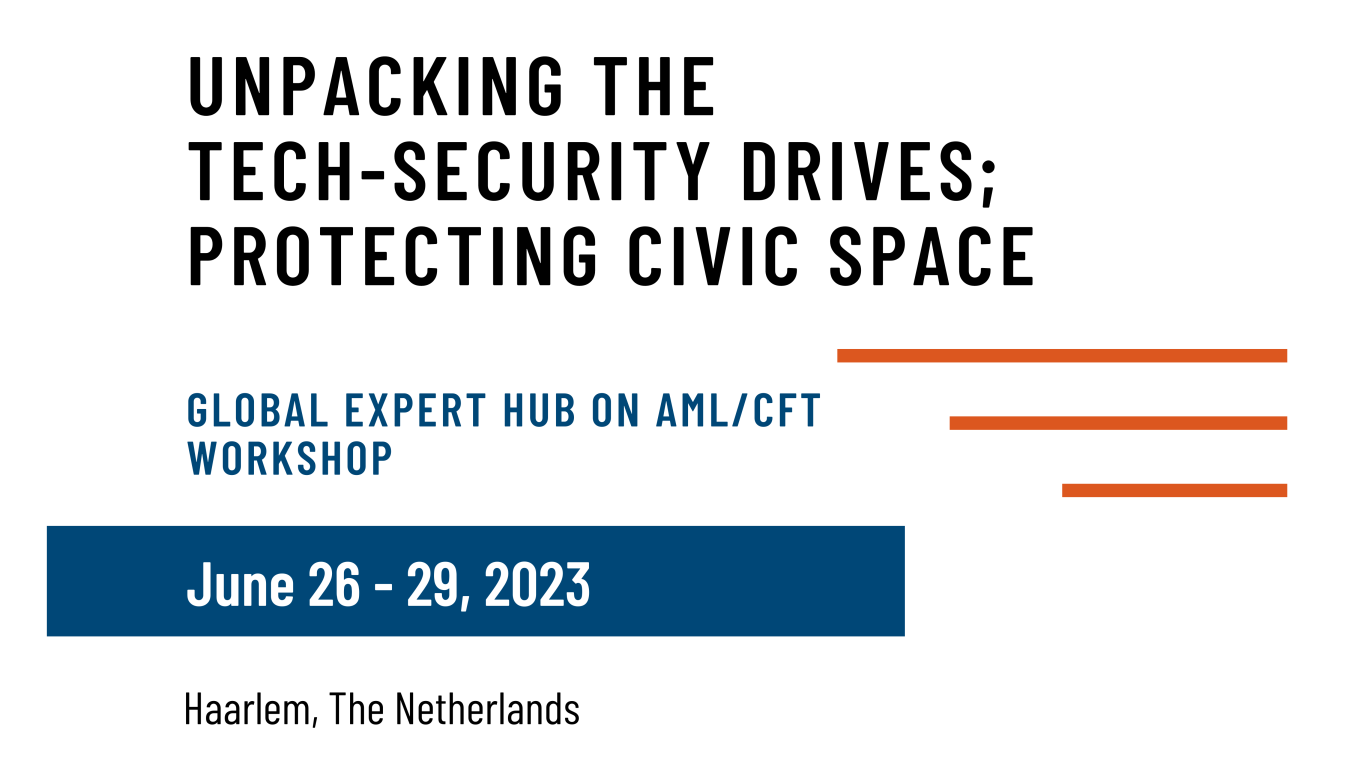In June 2023, ECNL hosted a workshop focusing on technology, security and civic space in Haarlem, The Netherlands. We were joined by representatives of organisations from across the globe, including our partner Balkan Civil Society Development Network (BCSDN). BCSDN published a write up from the event, which you can find on their website and below:
"On 27 and 28 June, in Haarlem, BCSDN representatives participated in a workshop for the Global Expert Hub on AML/CFT workshop, titled “Unpacking the Tech-Security Drives, Protecting Civic Space“, organised by ECNL. Around 40 civil society organisations and experts from across the globe participated in the workshop, learning and discussing issues such as emerging technologies, fintech, content moderation, digital surveillance, etc.
On the first day, the focus of the workshop was on the use of emerging technologies, particularly fintech, for AML/CFT purposes and their impact on the NPO sector. While the financial sector seems to be widely deploying big data analytics, machine learning, and blockchain to reduce cost and time spent conducting due diligence and transaction monitoring, NPOs have fallen victim to the financial industry’s tendency to de-risk in order to avoid penalties arising from regulatory noncompliance. This results in financial exclusion: difficulties opening bank accounts, delayed transactions, or unexplained account closures. Experts and international organisations such as the FATF and IMF claim that emerging tech-powered compliance solutions may reduce these obstacles, but this is not yet evident. It is still unclear how these technologies are designed, developed and tested, how financial institutions procure, deploy and operate these technologies, or what safeguards are installed to mitigate unintended consequences of shrinking civic space and human rights violations.
As part of the workshop, the UN OCT team held the first presentation of the goFintel tool being developed to help member states address challenges from UN Security Council Resolution 2462 concerning the flow of funds to terrorists and the need to defeat all forms of terrorist financing. The software will aim to help Member States cooperate and correctly target any financial dealings that could potentially be used to fund terrorism. The tool is planned to go live by the end of 2023, but there are still many concerns, inconsistencies, and unanswered questions about its functioning. As announced, UNOCT will launch a consultative process to explore ways in which goFintel should approach human rights due diligence (HRDD) in line with human rights and UN policies and guidance, as well as human rights due diligence in tech development (by OHCHR), but it is not clear if there will be enough time for HRDD and consultations with CSOs. Nonetheless, CSOs will closely monitor the developments around goFintel and demand a seat at the table for these discussions, to raise concerns and present collected evidence of harm and financial exclusion from the use of fintech, in order to make sure these issues are timely considered and taken into account.
The second day of the workshop focused on content moderation and digital biometric surveillance, and particularly on their implication on human rights – privacy, freedom of speech, freedom of association, non-discrimination etc. The increased use of new technologies in CT is enabled by calls from international organisations to increase data collection and use of surveillance paired with the decline in cost of technology and data storage, ubiquity of devices, and increase in computer processing powers, and underpinned by the simplistic belief that technology is an easy “fix” to the problem of terrorism. The types of digital surveillance include interception of communications data and metadata from service providers, spyware, predictive algorithms, and biometrics-based technologies, all of which have a significant impact on basic freedoms and civic space.
Lessons learned from cases of misuse and abuse of emerging technologies for counter-terrorism purposes, show the importance of proportionate approaches and meaningful engagement with civil society prior to any use of technology in combating terrorism, ensuring their impact on human rights is not overlooked. To be proportionate, tech-based responses to terrorism must be based on a full risk assessment of their impact on human rights and civic space, and deployed in a way that mitigates the identified risks. This begins with meaningfully engaging various sectors, including relevant national authorities, companies, civil society, and academia, in these important processes."
If you are interested to learn more about the event and topic of the workshop, please click here for the workshop materials, including a list of relevant resources and all presentations.
